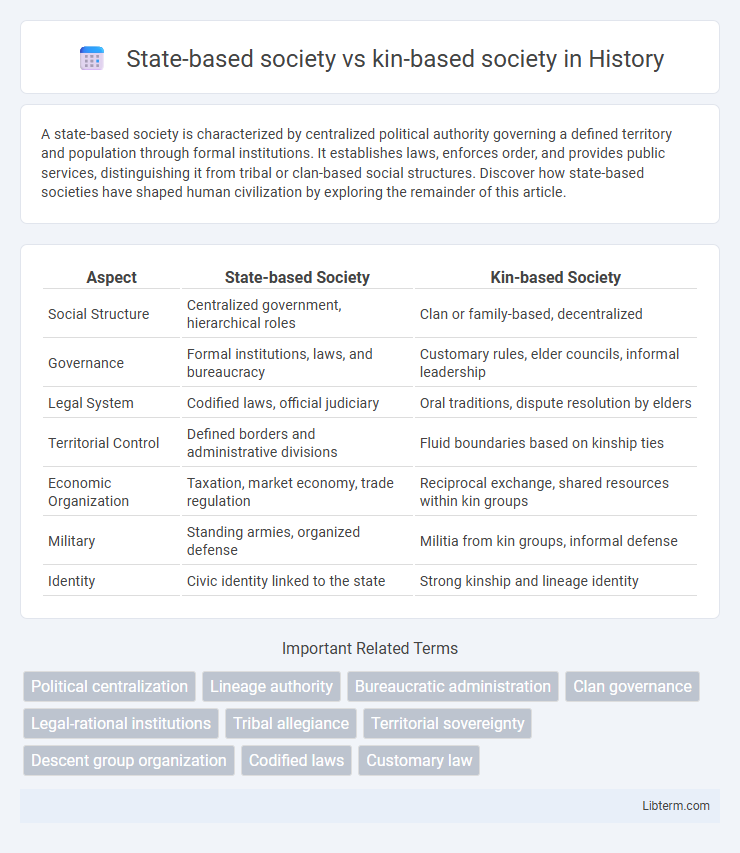A state-based society is characterized by centralized political authority governing a defined territory and population through formal institutions. It establishes laws, enforces order, and provides public services, distinguishing it from tribal or clan-based social structures. Discover how state-based societies have shaped human civilization by exploring the remainder of this article.
Table of Comparison
| Aspect | State-based Society | Kin-based Society |
|---|---|---|
| Social Structure | Centralized government, hierarchical roles | Clan or family-based, decentralized |
| Governance | Formal institutions, laws, and bureaucracy | Customary rules, elder councils, informal leadership |
| Legal System | Codified laws, official judiciary | Oral traditions, dispute resolution by elders |
| Territorial Control | Defined borders and administrative divisions | Fluid boundaries based on kinship ties |
| Economic Organization | Taxation, market economy, trade regulation | Reciprocal exchange, shared resources within kin groups |
| Military | Standing armies, organized defense | Militia from kin groups, informal defense |
| Identity | Civic identity linked to the state | Strong kinship and lineage identity |
Introduction to Societal Organization
State-based societies feature centralized governance structures with formal institutions, legal systems, and bureaucratic administration, enabling complex social stratification and large-scale coordination. Kin-based societies rely on familial ties and clan relationships as the primary framework for social organization, often governed by customary laws and communal decision-making. These contrasting models highlight the evolution from kinship-centered social order to territorially governed states as societies grow in complexity and population size.
Defining State-Based Societies
State-based societies are characterized by centralized political authority, formal institutions, and hierarchical governance structures that exercise control over defined territories and populations. These societies maintain complex legal systems, bureaucracies, and specialized roles, enabling the enforcement of laws, taxation, and organized military defense. Unlike kin-based societies, state-based societies rely on codified rules and institutional power rather than kinship ties to regulate social order and resource distribution.
Defining Kin-Based Societies
Kin-based societies are organized around family ties and lineage, where social roles, responsibilities, and inheritance are primarily determined by kinship relations. These societies rely on extended family networks for governance, conflict resolution, and resource distribution without formal centralized institutions. Social cohesion and communal identity in kin-based societies are maintained through clan structures, marriage alliances, and shared ancestry.
Historical Evolution of Social Structures
State-based societies emerged through centralized governance, codified laws, and institutionalized authority, fostering complex political hierarchies and urbanization. Kin-based societies relied on familial ties, clan systems, and kinship networks to organize social, economic, and political life, prevalent in early human history and small-scale communities. The transition from kin-based to state-based structures marked a significant evolution in social organization, enabling larger populations, resource management, and administrative control.
Governance: State Authority vs Kin Leadership
State-based societies exercise centralized governance through formal institutions, codified laws, and bureaucratic authority, ensuring uniform enforcement across defined territories. Kin-based societies rely on kinship networks where leadership emerges from familial ties, with authority often decentralized and informal, rooted in customs and consensus among clans or lineages. The contrast reflects the state's emphasis on legal-rational authority versus kin-based leadership's dependence on social relationships and traditional legitimacy.
Economic Systems: Centralization vs Redistribution
State-based societies exhibit centralized economic systems where resources and production are controlled by formal institutions, facilitating large-scale redistribution and regulation of wealth. Kin-based societies rely on reciprocal exchange and redistribution within family or clan groups, emphasizing collective ownership and social obligations without formal institutional control. The degree of economic centralization directly impacts social complexity, governance, and resource allocation mechanisms in these societies.
Law, Order, and Conflict Resolution
State-based societies implement formal legal systems with codified laws and institutionalized courts to maintain order and resolve conflicts. Kin-based societies rely on customary norms, kinship ties, and elder councils to mediate disputes and enforce social harmony. The presence of centralized authority in state-based societies contrasts with the decentralized, family-centered mechanisms found in kin-based groups.
Social Identity and Belonging
State-based societies cultivate social identity through formal institutions, legal systems, and shared citizenship, fostering a sense of belonging tied to nationality and civic roles. Kin-based societies derive social identity primarily from family ties, clan affiliations, and lineage, emphasizing mutual obligations and collective responsibility within intimate social networks. Belonging in state-based societies is often more abstract and impersonal, while kin-based societies create deep emotional bonds rooted in ancestry and tradition.
Adaptability and Resilience of Each Society
State-based societies exhibit high adaptability through centralized governance, allowing efficient resource allocation and rapid response to environmental or social changes. Kin-based societies rely on strong familial bonds and social networks, fostering resilience by maintaining flexible, decentralized social structures that enhance cooperation during crises. Both systems demonstrate unique strengths: state-based societies excel in managing large populations and complex infrastructures, while kin-based societies sustain cultural continuity and communal support in dynamic environments.
Contemporary Relevance and Transformation
State-based societies exhibit centralized governance and formal institutions that facilitate large-scale cooperation, making them pivotal in contemporary global politics and economics. Kin-based societies rely on familial ties and customary laws, often adapting through integration with state mechanisms to preserve cultural identities amid modernization. The transformation from kin-based to state-based structures involves complex shifts in social organization, legal authority, and resource distribution, reflecting ongoing dynamics in globalization and development studies.
State-based society Infographic

 libterm.com
libterm.com